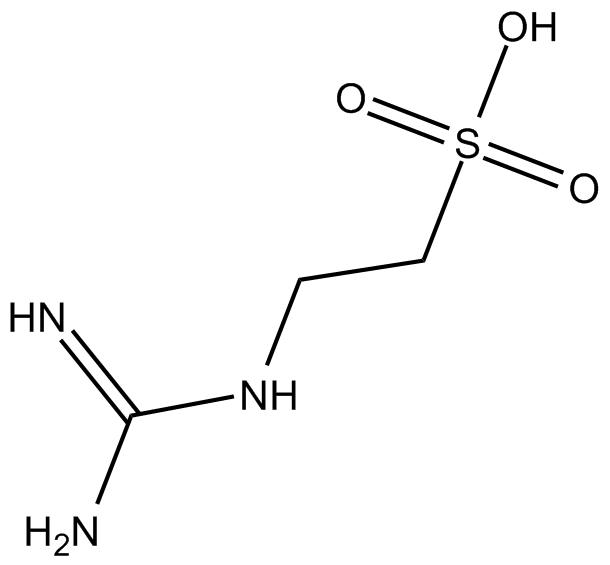Guanidinoethyl sulfonate (Synonyms: NSC 667063,Taurocyamine) |
| Catalog No.GC15461 |
competitive glycine receptor antagonist
Products are for research use only. Not for human use. We do not sell to patients.

Cas No.: 543-18-0
Sample solution is provided at 25 µL, 10mM.
Guanidinoethyl sulfonate is a competitive glycine receptor antagonist.
The glycine receptor, the receptor for the amino acid neurotransmitter glycine, is an ionotropic receptor producing its effects via chloride current. Glycine receptor is one of the most widely distributed inhibitory receptors in the central nervous system and has important roles in various physiological processes.
In vitro: Guanidinoethyl sulphonate was found to be an analogue of taurine and an inhibitor of taurine transport. Guanidinoethyl sulphonate was also shown to be a weak agonist at GABA(A) receptors, and was able to antagonize GABA-evoked responses. Guanidinoethyl sulphonate did not gate GlyR. 3. but antagonized glycine responses in a concentration-dependent and surmountable manner. Glycine receptor-mediated taurine responses were competitively antagonized by guanidinoethyl sulphonate. Taurine dose-response curves, in contrast to the glycine dose-response curves were shifted by guanidinoethyl sulphonate to the right in a parallel manner [1].
In vivo: Guanidinoethyl sulphonate delivered in the drinking water of rats for 1 month could effectively reduce taurine levels in brain structures and outside the brain by between 50 and 80 %, depending on the tissue. This partial taurine depletion could not affect either basal synaptic transmission or the late phase of long-term potentiation in hippocampal slices. In-vivo microdialysis studies in the hippocampus demonstrated that guanidinoethyl sulphonate was able to reduce extracellular taurine levels and the magnitude of taurine released in response to the application of either N-methyl-D-aspartate or a hypoosmotic solution [2].
Clinical trial: So far, no clinical study has been conducted.
References:
[1] Sergeeva, O. A.,Chepkova, A.N., and Hass, H.L. Guanidinoethyl sulphonate is a glycine receptor antagonist in striatum. British Journal of Pharmacology 137, 855-860 (2002).
[2] Suárez LM, Muoz MD, González JC, Bustamante J, Del Río RM, Solís JM. The taurine transporter substrate guanidinoethyl sulfonate mimics the action of taurine on long-term synaptic potentiation. Amino Acids. 2016 Nov;48(11):2647-2656. Epub 2016 Jul 15.
Average Rating: 5 (Based on Reviews and 24 reference(s) in Google Scholar.)
GLPBIO products are for RESEARCH USE ONLY. Please make sure your review or question is research based.
Required fields are marked with *




















